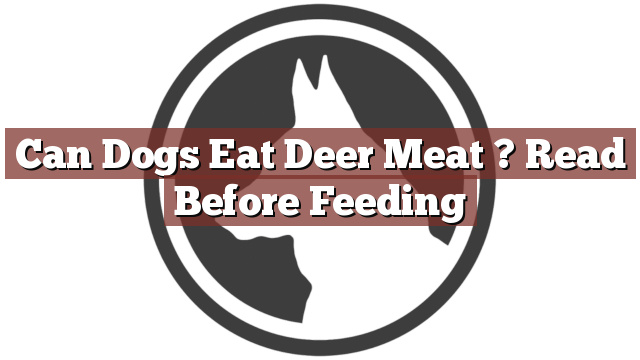Understanding Your Dog’s Dietary Needs
Proper nutrition is essential for maintaining the health and well-being of our canine companions. As responsible pet owners, it is crucial to understand our dogs’ dietary needs and provide them with a balanced and nutritious diet. Dogs are primarily carnivores, and their bodies are designed to digest and thrive on animal protein. While some fruits and vegetables can be beneficial as supplements, the majority of their diet should consist of high-quality meat. That being said, it is important to evaluate each type of meat carefully before feeding it to our dogs, including deer meat.
Can Dogs Eat Deer Meat? Read Before Feeding
Can dogs eat deer meat? Yes. Dogs can eat deer meat, and it can be a healthy and nutritious addition to their diet. Deer meat, also known as venison, is a lean source of protein that can provide a range of essential nutrients for your furry friend. However, it is crucial to take certain precautions before introducing deer meat into your dog’s diet.
When feeding your dog deer meat, it is important to ensure that it is fresh and properly sourced. Avoid giving your dog any meat that has been hunted or found in the wild, as it may carry parasites or diseases. Instead, opt for commercially processed or farm-raised venison that has been properly inspected and prepared for consumption. Furthermore, it is vital to remove all bones from the meat before feeding it to your dog, as they can pose a choking hazard or cause intestinal blockage.
Pros and Cons: Feeding Deer Meat to Your Dog
Feeding deer meat to your dog can have several benefits. As a lean source of protein, venison can support muscle development and maintenance, as well as provide essential amino acids. It is also low in fat, making it ideal for dogs that require a low-fat diet or are prone to obesity. Additionally, deer meat is rich in iron, zinc, and vitamin B12, which are crucial for your dog’s overall health and immune system.
However, there are a few potential drawbacks to consider. Some dogs may have allergies or sensitivities to certain types of meat, including venison. If your dog has never consumed deer meat before, it is recommended to introduce it gradually and monitor for any adverse reactions such as digestive upset or skin irritations. Also, while deer meat is generally safe for dogs, it should not become the sole source of their diet. Variety is key to providing a well-rounded and balanced nutrition.
Conclusion: Safely Nourish Your Dog with Proper Diet Choices
In conclusion, dogs can eat deer meat, but it is important to take certain precautions and consider the pros and cons before incorporating it into their diet. Always ensure that the deer meat is fresh, properly sourced, and free from bones. Monitor your dog’s reaction to introduce it gradually and watch for any signs of allergies or sensitivities. Remember, while deer meat can be a healthy addition, it should not be the sole source of your dog’s nutrition. Consult with your veterinarian to establish a well-balanced diet that meets your dog’s specific needs and preferences. By making informed dietary choices, you can provide your furry friend with the nourishment they need to live a happy and healthy life.
Thank you for taking the time to read through our exploration of [page_title]. As every dog lover knows, our furry friends have unique dietary needs and responses, often varying from one canine to another. This is why it's paramount to approach any changes in their diet with caution and knowledge.
Before introducing any new treats or making alterations to your dog's diet based on our insights, it's crucial to consult with a veterinarian about [page_title]. Their expertise ensures that the choices you make are well-suited to your particular pet's health and well-being.
Even seemingly harmless foods can sometimes lead to allergic reactions or digestive issues, which is why monitoring your dog after introducing any new food item is essential.
The content provided here on [page_title] is crafted with care, thorough research, and a genuine love for dogs. Nevertheless, it serves as a general guideline and should not be considered a substitute for professional veterinary advice.
Always prioritize the expert insights of your veterinarian, and remember that the health and happiness of your furry companion come first.
May your journey with your pet continue to be filled with joy, love, and safe culinary adventures. Happy reading, and even happier snacking for your canine friend!

